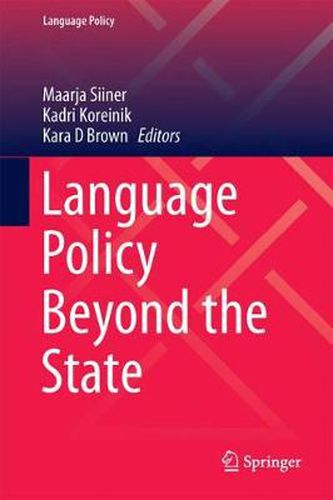Readings Newsletter
Become a Readings Member to make your shopping experience even easier.
Sign in or sign up for free!
You’re not far away from qualifying for FREE standard shipping within Australia
You’ve qualified for FREE standard shipping within Australia
The cart is loading…






This title is printed to order. This book may have been self-published. If so, we cannot guarantee the quality of the content. In the main most books will have gone through the editing process however some may not. We therefore suggest that you be aware of this before ordering this book. If in doubt check either the author or publisher’s details as we are unable to accept any returns unless they are faulty. Please contact us if you have any questions.
Language Policy beyond the State invites readers to (re-)consider the ways language policy is constituted, taken up, and researched if we look within and past the state. Contributors to this edited volume draw attention to language policy as always in the making, focusing on agency, on-the-ground practices, and ideologies. The chapters of the book reveal how simultaneous, and at times contradicting, language policies exist within a state and explore the complex roles played by families, businesses, educational institutions, and media in generating and appropriating these policies.
By moving away from language policy analysis concerned primarily with how official state policies address well-defined language problems, some of the contributions of the volume highlight how the problems themselves can be ideological artifacts or are discursively constructed in language ideological debates that are provoked by changes in the geopolitical situation in the region. Using qualitative and descriptive research, the book uses Estonia as a setting to examine the ways historic and contemporary populations navigate language policies in both local and transnational spaces. As a whole, the collection speaks eloquently and powerfully to current efforts to understand and map the ways multiple institutions and individuals-not just the state-play an active role in forming and taking up language policies.
$9.00 standard shipping within Australia
FREE standard shipping within Australia for orders over $100.00
Express & International shipping calculated at checkout
This title is printed to order. This book may have been self-published. If so, we cannot guarantee the quality of the content. In the main most books will have gone through the editing process however some may not. We therefore suggest that you be aware of this before ordering this book. If in doubt check either the author or publisher’s details as we are unable to accept any returns unless they are faulty. Please contact us if you have any questions.
Language Policy beyond the State invites readers to (re-)consider the ways language policy is constituted, taken up, and researched if we look within and past the state. Contributors to this edited volume draw attention to language policy as always in the making, focusing on agency, on-the-ground practices, and ideologies. The chapters of the book reveal how simultaneous, and at times contradicting, language policies exist within a state and explore the complex roles played by families, businesses, educational institutions, and media in generating and appropriating these policies.
By moving away from language policy analysis concerned primarily with how official state policies address well-defined language problems, some of the contributions of the volume highlight how the problems themselves can be ideological artifacts or are discursively constructed in language ideological debates that are provoked by changes in the geopolitical situation in the region. Using qualitative and descriptive research, the book uses Estonia as a setting to examine the ways historic and contemporary populations navigate language policies in both local and transnational spaces. As a whole, the collection speaks eloquently and powerfully to current efforts to understand and map the ways multiple institutions and individuals-not just the state-play an active role in forming and taking up language policies.